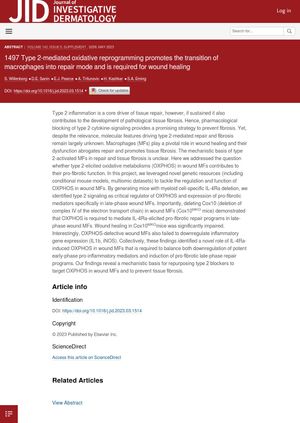Type 2-Mediated Oxidative Reprogramming Promotes Macrophage Transition into Repair Mode for Wound Healing
April 2023
in “
Journal of Investigative Dermatology
”

TLDR Type 2 inflammation helps wound healing by switching immune cells to repair mode.
The study "1497 Type 2-mediated oxidative reprogramming promotes the transition of macrophages into repair mode and is required for wound healing" investigates the role of type 2 inflammation and oxidative metabolisms (OXPHOS) in wound macrophages (MFs) in tissue repair and fibrosis. The researchers used genetic resources and mouse models to identify type 2 signaling as a critical regulator of OXPHOS and the expression of pro-fibrotic mediators in late-phase wound MFs. They found that deleting Cox10, a component of the electron transport chain, in wound MFs impaired wound healing and prevented the downregulation of inflammatory gene expression. These findings suggest that IL-4Ra-induced OXPHOS in wound MFs is necessary to balance the downregulation of early-phase pro-inflammatory mediators and the induction of pro-fibrotic late-phase repair programs. This provides a potential strategy for repurposing type 2 blockers to target OXPHOS in wound MFs and prevent tissue fibrosis.


